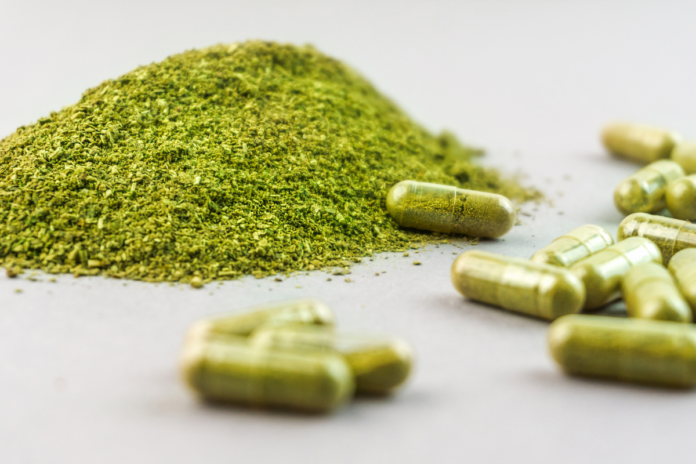Anxiety, a universal challenge for millions worldwide, continues to push individuals towards unconventional solutions. One such solution is kratom, a tropical tree from Southeast Asia. Traditionally, kratom was used for its dual effects as a stimulant and sedative. Now, it’s getting attention for its potential in addressing anxiety to some extent.
However, kratom’s leaves contain active compounds like mitragynine and 7-hydroxymitragynine, which interact with the brain’s opioid receptors, offering effects like pain relief and relaxation. Some users claim it may help with anxiety, but research is lacking.
So, read this article to learn about the use of kratom for anxiety and kratom from the best kratom brands, explore its potential for anxiety, and understand the factors to consider before trying it.
Some Different Forms Of Kratom
Kratom is available in multiple forms, including:
- Powder: Ground kratom leaves, the most common form, are often used to brew tea or mixed with food or beverages.
- Capsules: Pre-measured doses of kratom powder, offering convenience and precise dosing.
- Extracts: Concentrated forms of kratom, often used for more potent effects.
Insight On Strains Of Kratom
Kratom strains are usually categorized by the color of the leaf vein, which can be red, green, or white. Each strain is thought to have different effects, and getting these strains from reputable vendors is believed to provide more benefits. Therefore, Happy Go Leafy is a good choice, as it provides natural products without mixing harmful chemicals. Now, let’s learn about some of the kratom strains:
- Red Vein Kratom: Often considered the most sedating and is commonly used for pain relief and relaxation.
- Green Vein Kratom: Known for its balanced effects, providing both pain relief and energy.
- White Vein Kratom: Generally regarded as the most stimulating, often used for increased energy and focus.
Kratom And Anxiety: Mechanism of Action
The primary way kratom is thought to alleviate anxiety is through its interaction with opioid receptors in the brain. By binding to these receptors, kratom may produce calming and mood-enhancing effects.
Additionally, the alkaloids in kratom may influence other neurotransmitter systems, such as serotonin and dopamine, which play crucial roles in mood regulation.
Potential Benefits Of Kratom For Anxiety
- Calming Effects: Many users report that kratom helps them feel more relaxed and reduces feelings of nervousness.
- Mood Enhancement: Some strains of kratom, mainly green and red veins, are known for their mood-lifting properties, which may help alleviate the emotional burden of anxiety.
- Improved Focus: While anxiety may impair concentration, certain kratom strains (notably white vein) may help improve focus and mental clarity.
Anecdotal Evidence
Numerous anecdotal reports and user testimonials suggest that kratom may be effective in managing anxiety. However, it’s important to note that these accounts are subjective and vary widely from person to person. Factors such as individual physiology, the specific kratom strain, and dosage may significantly influence the effects.
Current Research Scientific Research On Kratom For Anxiety
Scientific research on kratom’s effectiveness for anxiety is still in its early stages. Most studies to date have focused on kratom’s potential for pain relief and its addictive properties. However, there is a growing interest in exploring its anxiolytic (anxiety-reducing) effects.
Notable Studies
- Animal Studies: Some animal studies have shown that kratom may produce sedative effects and reduce anxiety-like behavior, suggesting potential benefits for anxiety in humans.
- Human Studies: Limited human studies have been conducted, but some preliminary findings indicate that kratom may have anxiolytic effects. More rigorous clinical trials are needed to confirm these results and understand the underlying mechanisms.
Limitations And Challenges Of Kratom
- Lack of Standardization: Variability in kratom strains, dosages, and quality makes it challenging to conduct standardized research.
- Regulatory Issues: Kratom’s legal status varies widely, complicating efforts to study it comprehensively.
- Potential Bias: Many existing studies rely on self-reported data, which may be subjective and prone to bias.
Safety And Risks Management Of Kratom
While some individuals may find kratom beneficial for anxiety, it’s essential to be aware of potential side effects, including:
- Nausea: Common, especially with higher doses.
- Dizziness: This may occur, particularly with initial use or high doses.
- Constipation: A frequent side effect due to kratom’s interaction with opioid receptors.
- Dependency: Regular use of kratom may lead to dependence and withdrawal symptoms similar to opioids.
Risk
Kratom may have some addictive potential, mainly when used in high doses or over extended periods. Users may develop tolerance, requiring higher doses to achieve the same effects, which may lead to dependency.
Interaction with Other Substances
Kratom may interact with other medications and substances, potentially causing harmful effects. It’s crucial to consult with a healthcare professional before combining kratom with other treatments, particularly those for anxiety or depression.
Some Guidelines For Using Kratom For Anxiety
Consultation with a Healthcare Provider: Before considering kratom for anxiety, it is crucial to consult with a healthcare provider. They may help assess the potential benefits and risks based on individual health needs and medical history.
- Choosing the Right Strain: Red Vein Kratom: May be suitable for those seeking relaxation and relief from anxiety-related tension.
- Determining the Appropriate Dosage: Starting with a low dose and gradually increasing it may help minimize side effects and determine the optimal amount for anxiety relief. Lower doses (1-3 grams) are typically stimulating, while higher doses (5-7 grams) may be sedating.
- Monitoring Effects: Keeping a journal to track dosages, strains, and effects may help identify what works best for individual needs. Monitoring for any adverse effects or signs of dependency is also crucial.
- Avoiding Long-Term Use: To minimize the risk of dependency, it’s advisable to use kratom intermittently rather than daily. Taking regular breaks may help prevent tolerance and reduce the risk of withdrawal symptoms.
Alternative Treatments For Anxiety
- Medications: Selective serotonin reuptake inhibitors (SSRIs), benzodiazepines, and other anxiolytics are commonly prescribed for anxiety.
- Psychotherapy: Cognitive-behavioral therapy (CBT) and other therapeutic approaches may be highly effective in managing anxiety.
Natural Alternatives
- Herbal Supplements: Other supplements like valerian root, passionflower, and kava have also been used for anxiety.
- Lifestyle Changes: Regular exercise, a healthy diet, and adequate sleep may significantly impact anxiety levels.
- Mindfulness Practices: Meditation, yoga, and other mindfulness practices may help reduce anxiety and improve overall mental health.
Final Take: Can You Use Kratom For Depression And Anxiety?
Kratom presents a potential alternative for managing anxiety, with some users reporting significant benefits. However, the lack of comprehensive scientific research, the potential for side effects, and the risk of dependency are critical factors to consider.
Consulting with a healthcare provider, starting with low doses and monitoring effects, may help mitigate risks. It’s also essential to explore other treatments and lifestyle changes to manage anxiety effectively.
As interest in kratom continues to grow, more rigorous research is needed to understand its benefits and risks fully. For now, individuals considering kratom for anxiety should proceed with caution and seek professional guidance to ensure safe and informed use.










